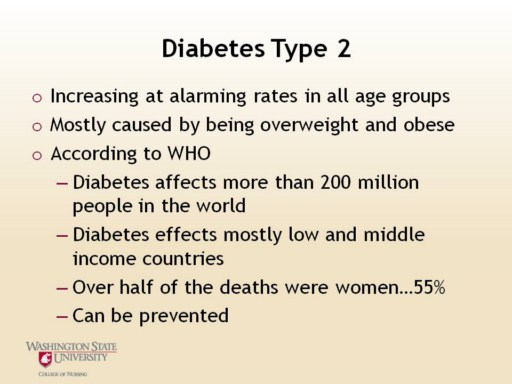| front |1 |2 |3 |4 |5 |6 |7 |8 |9 |10 |11 |12 |13 |14 |15 |16 |17 |18 |19 |20 |21 |22 |23 |24 |25 |26 |27 |28 |29 |30 |review |
 |
According to WHO, Fact sheet 312. Retrieved from http://www.who.int/mediacentre/factsheets/fs312/en/index.html
“More than 220 million people worldwide have diabetes. In 2005, an estimated 1.1 million people died from diabetes.1 Almost 80% of diabetes deaths occur in low- and middle-income countries. Almost half of diabetes deaths occur in people under the age of 70 years; 55% of diabetes deaths are in women. WHO projects that diabetes deaths will double between 2005 and 2030. Healthy diet, regular physical activity, maintaining a normal body weight and avoiding tobacco use can prevent or delay the onset of diabetes.”
What are common consequences of diabetes? (WHO Fact Sheet 312)
“Over time, diabetes can damage the heart, blood vessels, eyes, kidneys, and nerves. Diabetes increases the risk of heart disease and stroke. 50% of people with diabetes die of cardiovascular disease (primarily heart disease and stroke). Combined with reduced blood flow, neuropathy in the feet increases the chance of foot ulcers and eventual limb amputation. Diabetic retinopathy is an important cause of blindness, and occurs as a result of long-term accumulated damage to the small blood vessels in the retina. After 15 years of diabetes, approximately 2% of people become blind, and about 10% develop severe visual impairment. Diabetes is among the leading causes of kidney failure. 10-20% of people with diabetes die of kidney failure. Diabetic neuropathy is damage to the nerves as a result of diabetes, and affects up to 50% of people with diabetes. Although many different problems can occur as a result of diabetic neuropathy, common symptoms are tingling, pain, numbness, or weakness in the feet and hands. The overall risk of dying among people with diabetes is at least double the risk of their peers without diabetes.”
What is the economic impact of diabetes? “Diabetes and its complications have a significant economic impact on individuals, families, health systems and countries. For example, WHO estimates that in the period 2006-2015, China will lose $558 billion in foregone national income due to heart disease, stroke and diabetes alone.”
Exercise: Who in your family and community has diabetes? How has it affected their daily lives? How do they manage and take care of their diabetes? |